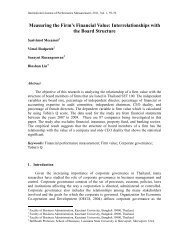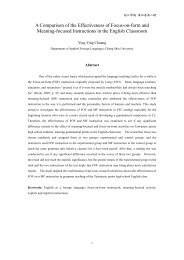ç®é - ç 究ç¼å±è - 稻æ±ç§ææ¨ç®¡çå¸é¢
ç®é - ç 究ç¼å±è - 稻æ±ç§ææ¨ç®¡çå¸é¢
ç®é - ç 究ç¼å±è - 稻æ±ç§ææ¨ç®¡çå¸é¢
You also want an ePaper? Increase the reach of your titles
YUMPU automatically turns print PDFs into web optimized ePapers that Google loves.
稻 江 學 報 第 五 卷 第 一 期<br />
The Impact of Three-Stage Influence Theory of Technical Factors on<br />
the Success of Social Intervention: A Case Study of ICT-Based<br />
Poverty Alleviation<br />
TsaiMing Chang<br />
Department of Sociology, Tsinghua University<br />
Abstract<br />
Information and communication technology (ICT) has brought an innovation revolution in all domains while<br />
giving rise to the digital divide which refers to an asymmetric distribution of resources. To narrow this gap, many<br />
local governments have invested heavily in promoting ICT-based poverty elevation projects in order to elevate the<br />
ability of the disadvantaged groups in ICT application but also to promote the development for the communities.<br />
Nonetheless, we found out that not all communities embraced information and communication technology.<br />
The study concludes that ICT-based poverty elevation projects need more time during their implementation. If a<br />
project failed to progress over the chasm period, it would fail. The study also proposes the “ICT acceptance model” to<br />
explain the individual actors decide whether to accept ICT will base on their own "rational" preference and<br />
cost-benefit analysis; and base on the "social" motivation from outside.<br />
The paper ends up with the important conclusions of the technical factors in each intervention plan will<br />
influence the community acceptance process through the three-stage influence theory; in the gap phase, it is<br />
important to hold on the optimization for the plan’s successful entry into the inertia phase.<br />
Key words: ICT -based poverty alleviation, community acceptance, social intervention, social exclusion<br />
243












